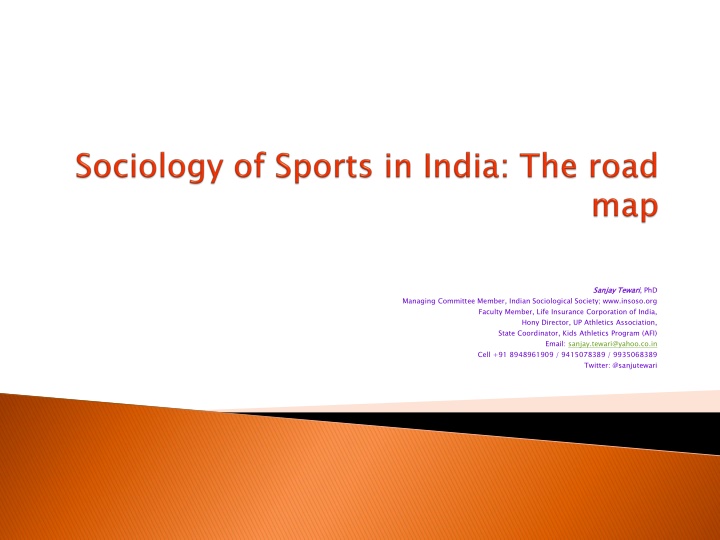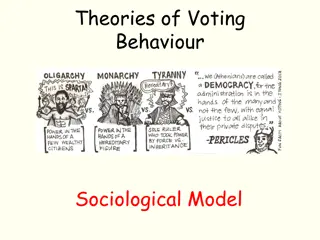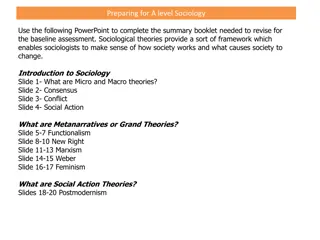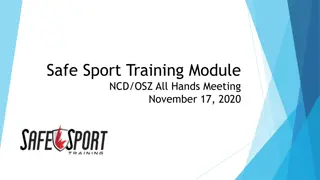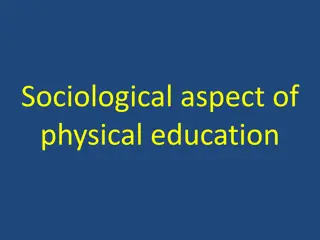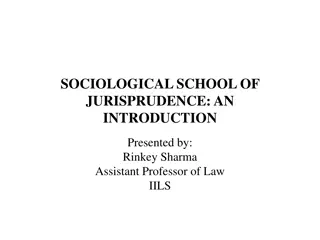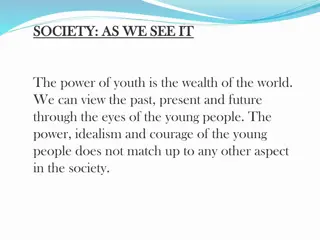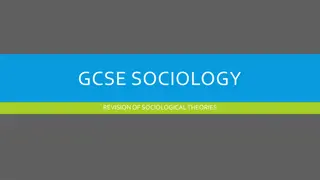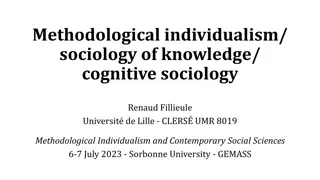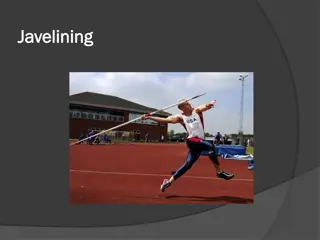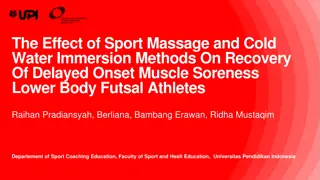Exploring the Sociological Perspective of Sport and Development
Over the past decade, there has been a significant emphasis on using sport as a tool for development. This includes promoting physical health benefits, social integration, and inclusiveness. The concept of development has evolved beyond mere economic growth to encompass social, cultural, and political aspects, as highlighted by the UN Declaration on the Right of Development. Sport plays a crucial role in fostering social cohesion, promoting healthy living, and contributing to overall well-being. Understanding the sociological perspective of sport can shed light on its role in societal development.
Download Presentation

Please find below an Image/Link to download the presentation.
The content on the website is provided AS IS for your information and personal use only. It may not be sold, licensed, or shared on other websites without obtaining consent from the author.If you encounter any issues during the download, it is possible that the publisher has removed the file from their server.
You are allowed to download the files provided on this website for personal or commercial use, subject to the condition that they are used lawfully. All files are the property of their respective owners.
The content on the website is provided AS IS for your information and personal use only. It may not be sold, licensed, or shared on other websites without obtaining consent from the author.
E N D
Presentation Transcript
Sanjay Sanjay Tewari Tewari, PhD Managing Committee Member, Indian Sociological Society; www.insoso.org Faculty Member, Life Insurance Corporation of India, Hony Director, UP Athletics Association, State Coordinator, Kids Athletics Program (AFI) Email: sanjay.tewari@yahoo.co.in Cell +91 8948961909 / 9415078389 / 9935068389 Twitter: @sanjutewari
Over the past decade, UN agencies, international sport federations, international and national non- governmental governments have been using sport as a tool for development. attributed to this belief is documented from studies that under appropriate conditions physical health benefits of sport such as prevention of diseases, lessening of likelihood of unhealthy practices (such as illegal drug use and unsafe sex), potential to positively influence social integration and inclusion of people enhancement of self-worth and the likes contribute to the social fabric of our society. organizations (NGOs) and national The crucial rationale that can be with disabilities, women and girls,
The level of development of a Nation which was initially considered only in economic terms limiting itself to dependence on industrial, agricultural and/or service sectors, is witnessing a paradigm shift. The idea that well-being of a country only on the pretext of economic growth was challenged by the United Nation s Declaration on the Right of Development (1986): . development is a comprehensive economic, social, cultural and political process, which aims at the constant improvement of the well-being of the entire population and of all individuals on the basis of their active, free and meaningful participation in development and the fair distribution of benefits there from.
Perhaps when we talk of development, more pervasively there should be a talk of Sport. ..Sport implies to all kinds of physical activities that contribute to physical fitness, psychological well-being and social interface, such as structured or competitive sport, play, recreation, and aboriginal sports and games (European Charter 2001). Sport development, social cohesion and understanding amongst people (Kofi Annan, Former United Nations Secretary General). It promotes healthy living, which can better be described as the ability to utilize well the intrinsic and extrinsic resources within each dimension of life to participate fully in life activities which contribute to growth and development in each stage of the lifestyle of a person; from birth, infancy, to aging. is an important tool to promote issues of
In todays talk, we intend to study the sociological perspective of sport through which the development mechanism can be generated, it would be appropriate to apprehend it in a broader sense. This field should be concerned with the descriptions and explanations of the interrelations components the unique feature about the sociological approach to sport, as distinct that from psychology has been a focus about sport in its function as a component of social organization (Edwards, Harry: 1973) Thus, sport is a vital component of major sociological concepts such as social organization, socialization, culture, deviance, small groups, collective behavior, mass media, and institutional interrelationships (education, politics, and religion). between sports and other social
The sociological perception of sports is based on three fundamental themes:- 1)sport sociological examination like the more traditional institutions marriage/family, law, health/medicine education, and science; 2) sport is a microcosm of the larger society and as such reflects and reinforces the foremost philosophy; and 3) several institutional links between sport and other societal institutions make it impossible for changes in one sphere not to have deep effects in all spheres. is a of social politics, institution religion, worthy economy, of
With context to India, there is almost no research work done in this area, particularly with reference to the sociological measurements pertaining to growth and development of the children and youth through sports practices. As such, reliance on a single type or source of data (statistics, case profiles, and interviews with stakeholders and/or participants) will fail to capture the complexities of child/youth development and many studies need to be reflected upon, apart from evidence based research. the relationship between sport and
In most developing nations today, young people make up the largest segment of the population in some cases more than 50%. In most cases, the number of young people will peak in the next 10 years, in some cases in the next 20 years. This significant fiscal pressures to fund secondary education communicable and infectious diseases such as HIV and AIDS, to add to, new ones such as the Covid-19. The large number of young people also offers an historic opportunity. means that countries will be facing and the prevention of non-
The emerging workforce is young, and the overall population contains relatively few elderly individuals and children to support. For governments, this can free up resources to invest in things like human capital that yield high development returns. To maximize presents, it is important to invest in and support today s children and youth. Investing in children and youth today will ensure that they are healthy and well equipped to manage the critical life transitions ahead of them. While the early years are an important determinant of a child s future, adolescence is also critical multiple transitions that set the stage for adult life. the opportunity this young cohort
The World Bank has identified five components of because transitions, that have a major impact on how each safeguarded, developed and deployed: it involves youth development, or young person s human capital is Continuing to learn; Starting to work; Developing a healthy lifestyle; Beginning a family; and Exercising citizenship.
The importance of Sports Sociology can be readily gauged by the global attention it has been receiving for the past some years, and this importance has increased vigorously at least during the past two decades. commitments are as follows:- In 1959, the UN Declaration of the Rights of the Child recognized every child s right to play and recreation. In 1978, UNESCO echoed this sentiment, declaring sport and physical education a fundamental right for all in its International Charter of Physical Education and Sport, adopted by the General Conference at its twentieth session in Paris. Some of the grounds for these vital
In 1999, the third International Conference of Ministers and Senior Officials Responsible for Physical Education and Sport (MINEPS III) put forward the Declaration of Punta Del Este, which committed to a focus on sport for all. Governments again acknowledged the right of children and youth to sport and recreation in 2002 when the UN General Assembly adopted A World Fit for Children. Following the report of the UN Inter-Agency Task Force on Sport for Development and Peace in 2003, the UN General Assembly passed a series of resolutions entitled Sport as a Means to Promote Education, Health, Development and Peace in 2003, 2004 and 2006. In 2005, the United Nations proclaimed 2005 the International Year for Sport and Physical Education (IYSPE) and called on decision-makers to come together to support sport and physical education activities and sport-based development.
These commitments reinforce the importance of sport and play as a basic human right for all children and youth. Sport can add significantly to global, national and local efforts to give children a healthy start. Sport can help those who haven t received a good start, and equip youth with the information, skills, personal and social resources, and support needed to make key life transitions successfully. It is important to note, however, that potential come from developed countries. much of the facts supporting sport s
More focused research and evaluation of policies and programs generate undertaken in these contexts. However, sport is already being used worldwide to advance child and youth development and education, suggesting that its benefits are already appreciated, if not yet fully understood or explained. Existing appropriate programs for young children can help ensure they receive the positive experiences and stimulation through play that they need to take advantage of critical developmental windows and establish a foundation for success. is knowledge needed in developing and nations, initiatives to inform evidence shows that developmentally
Involving parents and caregivers allows programs to pass on simple and enjoyable ways for them to help their children develop and grow through play. The role development tremendously over the past decade, and countries all over the globe have started concentrations on this vital issue in order to socially their denizens. Countries have empirically observed that a sporting nation is a strong nation, both physically and mentally. Example of countries of the likes of the United States of America, China, Canada, Australia, United Kingdom are before us and these nations have consistently maintained the standards of a sporting nation. of sport in crisis management, social social development and community building has augmented socially uplift uplift the standards of
Small countries such as Japan, the Korea, and Kenya etc. have made steady inroads. The secret of their success are coupled with the coordinated efforts of various agencies involved in promotion of sports, creation of infra structure from the grass root compared to the progress of these nations, there has been little or rather no progress in India s performance sports programs. Previously, some attempts have been made by the Government of India to analyze performance. level and intensive coaching. As over the years despite various the reasons behind the dismal
Some instances to quote are formation of the Amrik Singh Committee in 1987 to study the report of Indian Olympic Association on the show of India in the Tenth Asian Games held at Seoul. Another Committee headed by Mr. M.M. Rajendran in 1991 was constituted to study all sports schemes. While as state subject, sports development comes within the purview of the States up to the state level; at the national and international level, (including meeting international treaty obligations), it falls within the realm and remit of the Union Government under its residuary powers and within the ambit of Entries 10 and 13 of the Union List in the Seventh Schedule of the Constitution of India (National Development Code of India, 2011, Ministry of Youth & Sports Affairs, Government of India).
However, the sports culture in India is one prime issue sociological mindset of parents towards sports which visualizes it only as a recreational activity (that too in very less number of cases) and not as a curriculum academics leaving behind sports are some of the concerns which require investigation. Research directed at the relationship between parents and their children is important in that the behavior and approach of parents may impact the players desire to continue playing sports. which needs to be analyzed. The career growth which prospect, puts the educational emphasis more on
The sociology of sport, while grounded in sociology, has always been much more of a social sociology, work in the field encompasses history, political science, human geography, anthropology, economics. sociology such as, cultural studies, media studies, represented in the field. science of sport. In addition to social the psychology new and of Also, off-shoots and gender studies, are well
The aims of the sociology of sport are: to critically examine the role, function and meaning of sport in the lives of people and the societies they form; to describe and explain the emergence and diffusion of sport over time and across different societies; to identify the processes of socialization into, through, and out of modern sport; to investigate the values and norms of dominant, emergent and residual cultures and subcultures in sport; to explore how the exercise of power and the stratified nature of societies place limits and possibilities on people's involvement and success in sport as performers, officials, spectators, workers or consumers; to examine the way in which sport responds to social changes in the larger society; to contribute both to the knowledge base of sociology more generally and also to the formation of policy that seeks to ensure that global sport processes are less wasteful of lives and resources. The aims of the sociology of sport are:
The sociology of sport also seeks to critically examine common sense views about the role, function and meaning that sport has in 'natural' sociologists seek to provide a more social and scientifically adequate account that can inform both the decisions and actions of people and the policy of governments, NGO's and sport organisations. Although, as in sociology more generally, there are several different relationship sociologists of sport do have certain assumptions in common. For example, sociologists, whether they examine the 'micro' or 'macro' aspects of sport, seek to embed their research in the wider cultural and structural context. different societies. By challenging views and taken-for-granted about sport, perspectives between from sport, which cultures to examine and the societies,
In the context of sport sciences, sociologists of sport seek to generate knowledge that will contribute to 'human development' as opposed to 'performance efficiency'. That is, they seek to critically examine the costs, benefits, limits and possibilities of modern sport for all those involved, rather than focus on the performance efficiency of elite athletes. departments examine sport in the same way they would examine religion, law or medicine - to highlight aspects of the general human condition. Sociology of sport, then, seeks not only to contribute to its parent discipline, but also to changing the sports world. With respect to the latter, research seeks to 'debunk' popular myths about sport, critically appraise the actions of those more powerful groups involved in sport, and inform social policy towards sport. Those sociologists working with sociology
Body of Knowledge Although the first texts on sociology of sport appeared in the early 1920's, this sub-discipline did not develop until the early/mid 1960's in Europe and North America. A small number of scholars from both physical education and sociology formed the International Committee for the Sociology of Sport (ICSS) in 1965. From this point on, symposia, conferences and congresses were held annually and theoretical and empirical work was presented. Researchers from different sociological backgrounds began to develop sociological definitions of sport, conduct pioneering work in different aspects of sport, and develop undergraduate, Master's and doctoral courses and programs. Research areas include sport and socialization, sport and social stratification, sport subcultures, the political economy of sport, sport and deviance, sport and the media, sport, the body and the emotions, sport violence, sport politics and national identify, sport and globalization. Body of Knowledge: :
On this basis the sub-discipline has now developed a sophisticated understanding of how people become involved in sport; what barriers they face; and how gender, class, ethnicity and sexual relations work in sport. In considerable knowledge about how sport is mediated, contoured by a complex political economy, and bound up in global identity politics. addition, scholars have developed
Over empirically developed societies. The sub-discipline has various edited works, handbooks and textbooks from North America and Europe. Sociology of sport has also been established in Asia and more recently scholars from South America and Africa are using sociological perspective to help make sense of the social problems that beset sport, and to understand sociological issues the last based on thirty years studies sports theoretical have in and been case various different how sport illuminates wider
Relationship to Practice: Sociology of sport, as noted, seeks to contribute to our understanding of sport and also to inform policy that will make the sports experience less wasteful of lives and resources. Sociologists of sport have sought to achieve this latter aim in several ways. by offering expert advice to government agencies, public enquiries and commission reports on areas such as drugs, violence and health education. by acting as an advocate for athlete's rights and responsibilities. by providing research for groups who seek to challenge inequalities of gender, class, ethnicity, age and disability, particularly with respect to access, resources and status. by promoting human development as opposed to performance efficiency models within physical education and sport science. by encouraging better use of human and environmental resources and thus ensuring that there is a sporting future for generations to come. Relationship to Practice:
Journals: The number of journals continues to grow in this area. The following journals are either devoted to sociology of sport or contain a high proportion of papers written from a sociological perspective. International Review for the Sociology of Sport (IRSS), quarterly; Sociology of Sport Journal (SSJ), quarterly; Journal of Sport and Social Issues (JSSI), quarterly; Culture, Sport, Society Leisure Studies; Japanese Journal of Sociology of Sport. Journals:
Organizational Network: International Level The sociology of sport is internationally represented by the International Sociology of Sport Association (ISSA, formerly ICSS, founded in 1965), (www.issa1965.org) which also publishes the International Review for the Sociology of Sport. This body is a research committee of the International Sociological Association (ISA) and also an official committee of ICSSPE (the International Council of Sport Science and Physical Education). At present there are 500 members from different parts of the globe. ISSA holds annual conferences, including congresses in conjunction with the World Congress of Sociology and the Pre-Olympic Scientific Congress. As the international 'umbrella' organization, ISSA consults with national and regional groups. Some national groups are federated with the national sociological association organization. Either through ISA or ICSSPE such groups have a direct link to ISSA. There are also regional groups in areas such as Asia and North America - NASSS, the North American Society for the Sociology of Sport, which publishes the Sociology of Sport Journal, is the most well known regional group. European researchers are also linked to the European College of Sport Science (ECSS). International Level of that country, or with a sport science/physical education
The objectives of the International Sociology of Sport Association are To promote international cooperation in the field of sociology of sport. To exchange information among all countries concerning the results of research in the sociology of sport. To convene international seminars or symposia on aspects of the sociology of sport. To prepare and circulate reports about the social backround of sport and the status of the sociology of sport in different countries. To cooperate with ICSSPE, ISA and other committees, groups or organizations in order to solve tasks of general interest. To identify sociological problems in sport, and where appropriate, organize international research programs concerning the same. To oversee and coordinate the official publications of ISSA . To advise and facilitate the establishment of other continental, regional and national sociology of sport societies. The objectives of the International Sociology of Sport Association are: :
We also have the Research Committee 27 on Sociology Sociological sociology.org), which is sister to ISSA. The on- going decentralized in Research Committees, Working Groups and Thematic Groups, each dealing with a well recognized specialty in sociology. These groups bring together scholars who wish to pursue comparative research on a transnational basis and they constitute basic networks of scientific professional exchange. of Sports, Association( activities with the International (www.isa- the ISA of ) scientific ISA are research, intellectual debate and
Sociology of Sports was warranting a beginning in the field of Sociology in India for long. Despite the potential of sport complexities, Sociologists in India remain disinterested in the area (and sport generally) as avenues of legitimate study. Sociologists opportunities to know and engage with body politics, transformation and sustainable livelihood. Much work in this area has been done in many other parts of the globe, but here (with due regards to one and all), to repeat, Sociologists seem to be somewhat disinclined. Given the huge and tremendous potential of our country in sports, it demands attention of all the policymakers, and the role of Sociologists thus assumes great significance. development to highlight broader social Yet, questions sport development of programs & provide social structure agency,
Methodological considerations of Bourdieu Gidden discursive Bourdieu s social approach to the study of sport, the sub discipline of Sport Sociology, and the scope it offers to those inquiring into the social dimensions of sport and physical education have been widely recognized (Clement, 1995; Jarvie & McGuire, 1994; De France, 1995). His sociology has inspired many publications on sport studies (Clement, 1995) and Clement (1995) argues that it is the relevance of the bodily dimensions (which makes Bourdieu s approach attractive. Bourdieu and social Gidden s render the study of Sports Sociology as construction of practices. which I I talk talk of of as as the the mind mind set set) of sport that
He does not offer a social set of principles as much as a sociological method and a set of analytical tools through which culture and society can be understood and examined. His notion of habitus understanding how bodily engagement in day to day practice and in the practice of sport and other institutionalized physical activity function to symbolize the interacting dynamics of culture, class collaborate Giddens structuration with what I intend to do, I do find a symmetry. in particular, suggests a means of and gender. However, when I try to
The structuration approach does not focus on the individual actor or societal totality but social practices ordered across space and time. Agency, as Giddens calls, is human action. To be human is to be an agent, although not all agents are human Giddens, can lead to both the reproduction and the produced in a context of the duality of structure and agency (Rob Stones, 2005, Structuration Theory, pp.4-5) and are not themselves simply agency. beings. The agency, according to transformation of society. Practices are
It is the practices that reproduce social structures and these social structures can develop the mind set particular the youth, by absorbing and driving them development. With the given potential and India developing as a youth nation in the forth coming 15 years, there are dream projects by which I intend to draw schedule as to why we have still to move ahead in this area of sports, despite that other big nations are already on the pace of development far more than us. of the very vast populace of India, in in to the main stream of national
It was only in 2014 that the Indian Sociological Society, after my continuous efforts, decided and approved the formation of the Adhoc Group on Sociology of Sports and the first sessions were held Bhubaneswar, India 27-29 December 2015. I was designated as Convener of this Group, and entrusted by the ISS to go ahead with this special initiative of spreading Sport Sociology all over India. Sociologist, at some point of time, previously, were disinclined toward this discipline, but now with the given time, scenario and changes in the global world, its importance is being readily organized. However, many efforts need to be diverted towards this end, given the size and populace of India, where issues of food, health and shelter still pop up. inserting Sport Sociology as a proper discipline for study at Universities and for the purpose of Research is approved by the Ministry of Youth Affairs and Sports, Government of India. at the All India Sociological Conference held at Proposal for
By naming 2005 as The International Year of Sport and Physical Education, the United Nations did much to broaden the analysis of sport, and child and youth development, acceptance of sport as both an end and a means to aspects of international development, such as the Millennium Development Goals (Van Eekeren, 2006, p.19). Although much of the literature in these sociology of sports studies use definitions, concepts and evidence from high-income countries, such as Canada, the United States, the United Kingdom and Australia, a great deal of international attention is being paid to the potential utility of sport for child and youth development in Lower Middle Income Countries (LMICs). globally, and to increase the
The potentials that exist within sport are those that can help with fundamentally different views of the world perhaps based upon opportunities to encourage trust, obligations, redistribution and orientated humanitarian world. The late novelist Susan Sontag (2002) once said about the novel that any novel worth reading is an education of the heart; it enlarges your sense of human possibilities and what human nature can be. Does this make sense in relation to sport, does it fulfill its potential to expand once sense of human possibilities, to delight, to inform and transform the worlds we live? respect for sport in a more socially
While it is important to explain and understand economic, psychological and many other explanations of what significant intellectual and practical questions often originate from questions relating to social change capacity of sport to assist with social change is not an option, particularly for students, teachers and researchers of sport, all of whom have the capacity and the platform to act as public intellectuals. social, historical, physiological, sport can do for society, the more (Jarvie, Grant 2007. To ignore the
A broader discussion relates to the capacity of (Burawoy, 2005). This issue is as relevant to the activities of sociologists of sport as it is to other sociologists and, indeed, to all university particularly those who are involved in the social sciences. sociology to address multiple publics teachers and researchers,
As stated previously, in India, the Sociology of Sports is yet to make marking routes. Very less work at all for the study of a sociological impact of sports on the development perspective has been carried out. References, books, bibliographies etc. in the fraternity of sports sociology in India are rare, to say, negligible. Studies such as, some which I have done, and some other, for that sake leading to study of sociological interests in the field of sports are not present. With the given youth potential of India, its young population, achievements in the field of sports, advancement of the Indian Economy, and other co-related factors, the need and interest in the area of sports sociology and studies has risen. It will indeed be a challenging assignment, as references from western countries can only be taken in to account. In this context more detailed analysis that the power of Bourdieu s theory, and the importance of sports, will become most apparent. advancement in the area of Indian Sociology,
It is for the first time in context to India that this research wing of sport, i.e. the Sociology of Sport addresses the importance of human beings in sport rather than sport itself. Thus, alongside reform, encouraged to undergo a substantial change. The contribution which I intend to deliver to the policy makers and educationists is as follows: vigorous Indian economic sports and social policy will be
1. Despite the growing number of actors and actions promoting sporting activity, it remains true that few of the young people are used to sports practices in India. To address the use of sports practices by the children and youth and inculcate a habit of indulging in to physical activities, the study will visualize those reasons which may prove to be of assistance in garnering their resources. 2. The present need and objective of this study can be satisfied qualitatively, especially in search of new paradigms and bold individual and collective research ventures and integration with related social sciences. if it develops quantitatively and
3.The socio-political situation of the States of India is responsible for the underestimation of sports developmental trends in families. This study will for understanding the reasons for underdevelopment in sports. 4. The value of this work embarking on the problems will be important above all due to the need to awaken and develop a sociological imagination in Indian society, a humanistic approach to matters related to sport, and also to formulate future hypotheses advanced empirical studies. sure contribute towards this direction in that would be useful for more
5.The physical culture society wherein social aspects of physical culture will be studied shall lay emphasis cultural transformations, changes regarding influence and functions, and on the description and analysis of basic developmental tendencies, resulting from the social character of this regulating human behavior in this context. 6.An emphasis is placed on maintaining a solid knowledge base of statistics and sports news, which can be utilized by researchers in future. on future in on researching sports, historical interests its determinants of studies on adaptation of culture, from value patterns and norms
7.The paradigmatic significance of sports contribution to the development and reinforcement of national identity will be identified through interviews, and this will contribute amply in forming a solid data base for sports councils, federations and ministries. 8.According to Wang (2006), national reputation is one clear indication of a nation s power strength (p. 91), and as Mercer (1996) noted, it reflects and affects the country s standing in the global arena. If more and more of the Indian youth gets associated with sports, the more the pride and power of the nation. 9.A broader perception of the significance of sport participation can be apprehended.
10.A shift from sport participation as exceptional behavior to sport participation as accepted and even outcome, as hypothesized and this paradigm shift in stances will help the Government in designing a policy of Sports for All. 11. In conclusion, the study of Sport Sociology is designed to get the ball rolling in the field of sports in regard to the systematic examination of social movement theories in India. normative behavior will be the likely
Journals Journals Rowe, David and Gilmour, Callum, 2010, Sport, Media, and Consumption in Asia: A Merchandised Milieu, American Behavioral Scientist Scheerder John, Vanreusel Bart and Taks Marijke, 2005, Stratification Patterns of Active Sport Involvement Among Adults, International Review for the Sociology of Sport Burdsey, Daniel, 2006, If I ever Play Football, Dad, Can I Play for England or India? British Asians, Sports and Diasporic studies , Sociology Spaaij, Ramon, 2009, Sport as a vehicle for social mobility and regulation for disadvantaged urban youth, Lessons from Rotterdam , International Review for the Sociology of Sport Jarvie, Grant, 2007, Sport, social change and the public intellectual , International Review for the Sociology of Sport Krawczyk Barbara and Krawczyk Zbiginew, 1989, Sociology of Sport in Scotland , International Review for the Sociology of Sport
Xiong Huan, 2007, The Evolution of Urban Society and Social Changes in Sports Participation At the Grassroots in China, International Review for the Sociology of Sport Davis, Nicholas W and Duncan, Margaret Carlisle, 2006, Sports Knowledge is Power Reinforcing Masculine Privilege through Fantasy Sport League Participation , Journal of Sports and Social Issues Stempel, Carl, 2005, Adult Participation Sports as Cultural Capital : A Test of Bourdieu's Theory of the Field of Sports , International Review for the Sociology of Sport Whisenant, Warren& Jordan, Jeremy S, 2008, Fairness & Enjoyment in School Sponsored Youth Sports , International Review for the Sociology of Sport Sage G.H., 1997, Physical Education, Sociology, and Sociology of Sport: Points of Intersection , Sociology of Sport Journal Harvey, J. and Houle, F. (1994) Sport, World Economy, Global Culture, and the New Social Movements , Sociology of Sport Journal Koch, J.V. and Leonard, W.M., 1978, The NCAA: A Socio-economic Analysis: The Development of the College Sports Cartel from Social Movement to Formal Organization , American Journal of Economics and Sociology Light, Richard L, 2010, Children s Social and Personal Development through Sports: A Case study of an Australian Swimming Club , Journal of Sport and Social Issues Georgakis, S., & Light, R., 2009, Visual data collection methods for research on the affective dimensions of children s personal experiences of PE , ACHPER Healthy Lifestyles MacPhail, A., Gorely, T., & Kirk, D., 2003, Young people s socialization into sport: A case study of an athletic club , Sport, Education and Society
Books Coakley, J. (2001) Sport in Society: Issues & Controversies. New York: McGraw-Hill Books Blee, K.M. and Taylor, V. (1997) Semi-structured Interviews in Social Movement Research , in B. Klandermans and S. Staggenborg (eds) Methods in Social Movement Research, pp. 92 117.Minneapolis: University of Minnesota Press. Bourdieu, P. (1986) Distinction: A social critique of the judgement of taste. London: Routledge. Henricks, T. S. (2006). Play reconsidered: Sociocultural perspectives on human expression, Chicago: University of Illinois Press. Bell, B, 2009. Sport Studies. Exeter: Learning Matters Bloyce, D and Smith A, 2008, Sport, Policy and Development: An introduction, London: Routledge Coalter, F,2002. Sport and Community Development: A Manual. Edinburgh: Sport Scotland Coalter, F, 2007. A Wider Social role for Sport: Who s keeping the score? London: Routledge Collins, M, 2009. Examining Sports Development. London: Routledge
